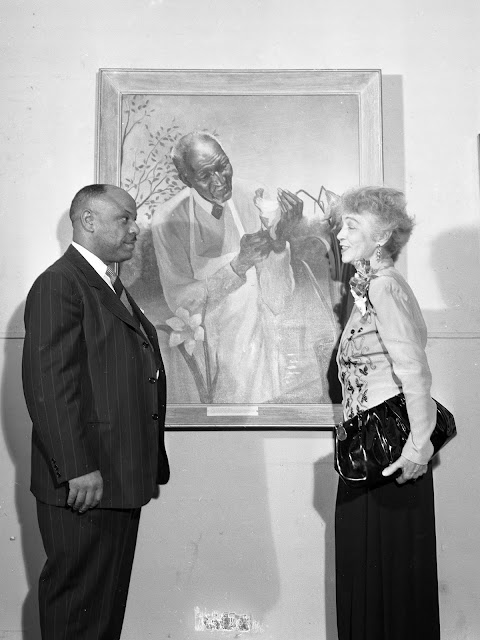This 1942 portrait of George Washington Carver by Betsy Graves Reyneau hangs in the National Portrait Gallery in Washington DC.
“Born into slavery, George Washington Carver overcame the obstacles of slender means and racial discrimination to seek an education. He believed that "when you can do the common things of life in an uncommon way, you will command the attention of the world." These words, coupled with his lifelong goal to help poor black farmers trapped in sharecropping and dependency on cotton as a crop, pervaded his work at Alabama's Tuskegee Institute, where he was director of agricultural teaching and research for nearly forty years. Carver's laboratory investigations led to the discovery of more than 450 new commercial products-ranging from margarine to library paste-that could be extracted from previously untapped sources such as the peanut and sweet potato. He demonstrated for southern farmers the wisdom of diversifying crops, instead of relying mainly on the soil-exhausting crop of cotton.” -- National Portrait Gallery
A 1948 photo shows Betsy Graves Reyneau with this portrait. The man standing with the artist is AACP president Thomas L. Griffith. (UCLA's copy of this photo, from which mine was taken, appears to be mirror flipped.)
Artist Betsy Graves Reyneau and AACP president Thomas L. Griffithstanding besides portrait of Dr. George Washington Carver, 1948
The National Archives has this 1943 poster entitled “George Washington Carver, One of America’s Great Scientists” created by Charles Henry Alston for the Office of War Information.
“Dr. Caver has created some 200 products from the lowly peanut, and over 100 from the sweet potato. Here are a few of them: Milk, Butter, Cheese, Coffee, Pickles, Flour, Soap, Ink, Cosmetics, Shaving Lotion, Breakfast Food, Starch, Vinegar, Shoe-Blacking, Library Paste, Candy. Who Knows?? He may yet give Uncle Sam the rubber he so urgently needs!!”
“Kidnapped as a baby by night riders, he was ransomed by his owner, Moses Carver, for a race horse, valued at $300.”
“He not only taught southern farmers soil conservation – He gave the south a new and lucrative industry – peanut products, yielding over $60,000,000 annually.”
By way of a punch line, Alston exclaims “He Can Cook, Too! -”









No comments:
Post a Comment